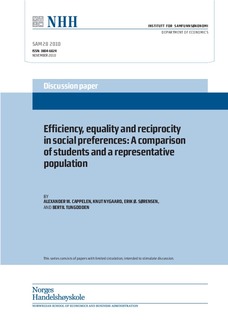Efficiency, equality and reciprocity in social preferences : a comparison of students and representative population
Working paper
Permanent lenke
http://hdl.handle.net/11250/163430Utgivelsesdato
2010-11Metadata
Vis full innførselSamlinger
- Discussion papers (SAM) [657]
Sammendrag
The debate between Engelmann and Strobel (2004, 2006) and Fehr, Naef, and
Schmidt (2006) highlights the important question of the extent to which lab experiments
on student populations can serve to identify the motivational forces present
in society at large. We address this question by comparing the lab behavior of a
student group and a non-student group, where the non-student group on all observable
factors is almost identical to the representative adult population in Norway.
All participants take part in exactly the same lab experiment. Our study shows
that students may not be informative of the role of social preferences in the broader
population. We find that the representative participants differ fundamentally from
students both in their level of selfishness and in the relative importance assigned
to different moral motives. It is also interesting to note that while we do not find
any substantial gender differences among the students, males and females in the
representative group differ fundamentally in their moral motivation.
Utgiver
Norwegian School of Economics and Business Administration. Department of EconomicsSerie
Discussion paper2010:28
